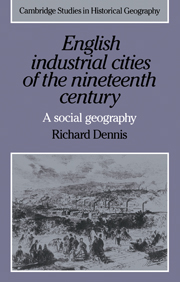Book contents
- Frontmatter
- Contents
- List of Figures
- List of Tables
- Preface
- A note on prices and distances
- 1 Urban geography and social history
- 2 Sources of diversity among Victorian cities
- 3 Contemporary accounts of nineteenth-century cities
- 4 Public transport and the journey to work
- 5 The geography of housing
- 6 Class consciousness and social stratification
- 7 The spatial structure of nineteenth-century cities
- 8 Residential mobility, persistence and community
- 9 Community and interaction
- 10 The containing context
- Notes
- Bibliography
- Index
10 - The containing context
Published online by Cambridge University Press: 05 January 2010
- Frontmatter
- Contents
- List of Figures
- List of Tables
- Preface
- A note on prices and distances
- 1 Urban geography and social history
- 2 Sources of diversity among Victorian cities
- 3 Contemporary accounts of nineteenth-century cities
- 4 Public transport and the journey to work
- 5 The geography of housing
- 6 Class consciousness and social stratification
- 7 The spatial structure of nineteenth-century cities
- 8 Residential mobility, persistence and community
- 9 Community and interaction
- 10 The containing context
- Notes
- Bibliography
- Index
Summary
Sociologists and social historians reacted to the urban history boom of the 1960s and 1970s by criticising both its methodological eclecticism and the idea that ‘the city’ constituted a ‘social entity in itself and for itself’, independent of the wider societies in which particular cities were situated. These criticisms were part of a larger attack on the theoretical nature of urban studies, where it was argued that there was no such thing as ‘urban sociology’ or ‘urban geography’. There was merely sociology or geography which occurred within or had implications for life in cities. Urban history was either local history by a more academic name or, if it was at all based in theory, followed some brand of social historical method.
Certainly, the label ‘urban history’ imparts a false sense of unity to a random collection of research, much as ‘historical geography’ is often used as a catch all for any geography of the past. The writings of Michael Anderson on family structure in Preston, John Foster on class consciousness in Oldham, David Cannadine on aristocratic landlords in Birmingham, E. P. Hennock on local government in Birmingham and Leeds, Martin Gaskell on housing in Pennine towns, are all claimed as components of urban history, yet each author might see his work as part of another tradition - historical sociology, social history, political history, planning history in which ideas are more important than locations.
- Type
- Chapter
- Information
- English Industrial Cities of the Nineteenth CenturyA Social Geography, pp. 289 - 296Publisher: Cambridge University PressPrint publication year: 1984



